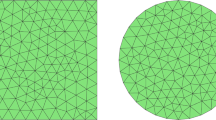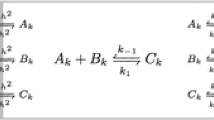Abstract
We consider the approximation in the reaction-diffusion norm with continuous finite elements and prove that the best error is equivalent to a sum of the local best errors on pairs of elements. The equivalence constants do not depend on the ratio of diffusion to reaction. We illustrate the usefulness of this result with two applications. First, we discuss robustness and locking properties of continuous finite elements with respect to the reaction-diffusion norm. Second, we derive local error functionals that ensure robust performance of adaptive tree approximation in the reaction-diffusion norm.

Similar content being viewed by others
References
Babuška, I., Osborn, J.: Analysis of finite element methods for second order boundary value problems using mesh dependent norms. Numer. Math. 34, 41–62 (1980)
Babuška, I., Osborn, J., Pitkäranta, J.: Analysis of mixed methods using mesh dependent norms. Math. Comp. 35, 1039–1062 (1980)
Babuška, I., Suri, M.: On locking and robustness in the finite element method. SIAM J. Numer. Anal. 29, 1261–1293 (1992)
Bebendorf, M.: A note on the Poincaré inequality for convex domains. Z. Anal. Anwendungen 22, 751–756 (2003)
Binev, P.: Adaptive methods and near-best tree approximation. Oberwolfach Rep. 29, 1669–1673 (2007)
Binev, P.: Tree approximation for hp-adaptivity. IMI Preprint, University of South Carolina (2014, to appear)
Binev, P., Dahmen, W., DeVore, R.: Adaptive finite element methods with convergence rates. Numer. Math. 97, 219–268 (2004)
Binev, P., DeVore, R.: Fast computation in adaptive tree approximation. Numer. Math. 97, 193–217 (2004)
Ciarlet, P.G.: Basic error estimates for elliptic problems. In: Ciarlet, P.G., Lions, J.-L. (eds.) Handbook of Numerical Analysis, vol. 2, pp. 17–352. North-Holland, Amsterdam (1991)
Clément, P.: Approximation by finite element functions using local regularization. Revue Francaise Automat. Informat. Recherche. Operationelle Ser. Rouge Anal. Numér. 9, 77–84 (1975)
Cohen, A., Dahmen, W., DeVore, R.: Adaptive wavelet schemes for nonlinear variational problems. SIAM J. Numer. Anal. 41, 1785–1823 (2003)
Dupont, T., Scott, R.: Polynomial approximation of functions in Sobolev spaces. Math. Comp. 34, 441–463 (1980)
Eriksson, K., Johnson, C.: Adaptive finite element methods for parabolic problems. I. A linear model problem. SIAM J. Numer. Anal. 28, 43–77 (1991)
Kossaczký, I.: A recursive approach to local mesh refinement in two and three dimensions. J. Comput. Appl. Math. 55, 275–288 (1994)
Maubach, J.M.: Local bisection refinement for \(n\)-simplicial grids generated by reflection. SIAM J. Sci. Comput. 16, 210–227 (1995)
Mitchell, W.F.: A comparison of adaptive refinement techniques for elliptic problems. ACM Trans. Math. Softw. 15, 326–347 (1989)
Nochetto, R.H., Siebert, K.G., Veeser, A.: Theory of adaptive finite element methods: an introduction. In: DeVore, R., Kunoth, A. (eds.) Multiscale, Nonlinear and Adaptive Approximation, pp. 409–542. Springer, Berlin (2009)
Nochetto, R.H., Veeser, A.: Primer of adaptive finite element methods. In: Naldi, Giovanni, Russo, Giovanni (eds.) Multiscale and Adaptivity: Modeling, Numerics and Applications, pp. 125–225. Springer, Berlin (2012)
Payne, L.E., Weinberger, H.F.: An optimal Poincaré inequality for convex domains. Arch. Ration. Mech. Anal. 5(1960), 286–292 (1960)
Scott, L.R.: A sharp form of Sobolev trace theorems. J. Funct. Anal. 25, 70–80 (1977)
Scott, L.R., Zhang, S.: Finite element interpolation of nonsmooth functions satisfying boundary conditions. Math. Comp. 54, 483–493 (1990)
Stevenson, R.: The completion of locally refined simplicial partitions created by bisection. Math. Comp. 77, 227–241 (2008). (electronic)
Veeser, A.: Approximating gradients with continuous piecewise polynomial functions. Found. Comput. Math. (2015). doi:10.1007/s10208-015-9262-z
Veeser, A., Verfürth, R.: Explicit upper bounds for dual norms of residuals. SIAM J. Numer. Anal. 47, 2387–2405 (2009)
Acknowledgments
We thank Peter Binev for a fruitful discussion on Theorem 8.1 as well as the anonymous referees for their critical remarks that helped us to improve a previous version of this work. Part of F. Tantardini’s work was founded by the DFG under grant AOBJ:612415.
Author information
Authors and Affiliations
Corresponding author
Additional information
Communicated by Wolfgang Dahmen.
Rights and permissions
About this article
Cite this article
Tantardini, F., Veeser, A. & Verfürth, R. Robust Localization of the Best Error with Finite Elements in the Reaction-Diffusion Norm. Constr Approx 42, 313–347 (2015). https://doi.org/10.1007/s00365-015-9291-5
Received:
Revised:
Accepted:
Published:
Issue Date:
DOI: https://doi.org/10.1007/s00365-015-9291-5
Keywords
- Approximation with continuous piecewise polynomials
- Finite element approximation
- Localization of best errors
- Robustness
- Adaptive tree approximation
- Reaction-diffusion norm




